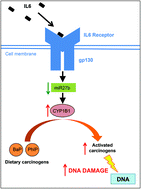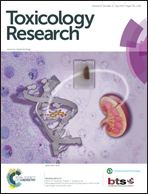Interleukin-6 promotes dietary carcinogen-induced DNA damage in colorectal cancer cells
Abstract
Colorectal cancer (CRC) is the third most common cancer worldwide with 80% of cases being sporadic, arising following a series of environment-induced gene mutations. DNA damaging pro-carcinogens such as benzo[a]pyrene (BaP) and 2-amino-1-methyl-6-phenylimidazo[4,5-b]pyridine (PhIP) contained in red or processed meats are a potential risk factor for disease. These dietary pro-carcinogens require metabolic activation to their genotoxic agents by cytochrome P450 (CYP) family 1 enzymes. We have previously demonstrated that the pro-inflammatory cytokine interleukin-6 (IL6) promotes CYP1B1 expression in CRC cells grown as 2D monolayers and that these two proteins are overexpressed in malignant tissue resected from CRC patients, indicating that inflammation influences metabolic competency in CRC cells. To determine whether IL6 can influence BaP and PhIP activation, we investigated IL6 effect on BaP- and PhIP-induced DNA damage in CRC cell lines grown as 2D monolayers and as 3D spheroids using the in vitro micronucleus (MN) assay. We also investigated the involvement of p53 and CYPs in the observed effects. MN formation was increased dose-dependently following treatment with BaP and PhIP while pre-treatment with IL6 further enhanced DNA damage. We confirmed that IL6-mediated effects were not caused by p53 expression changes but rather by CYP1B1 expression induction through miR27b downregulation. Taken together, these data demonstrate that inflammatory cytokines can promote dietary pro-carcinogen activation and DNA damage in CRC cells.


 Please wait while we load your content...
Please wait while we load your content...